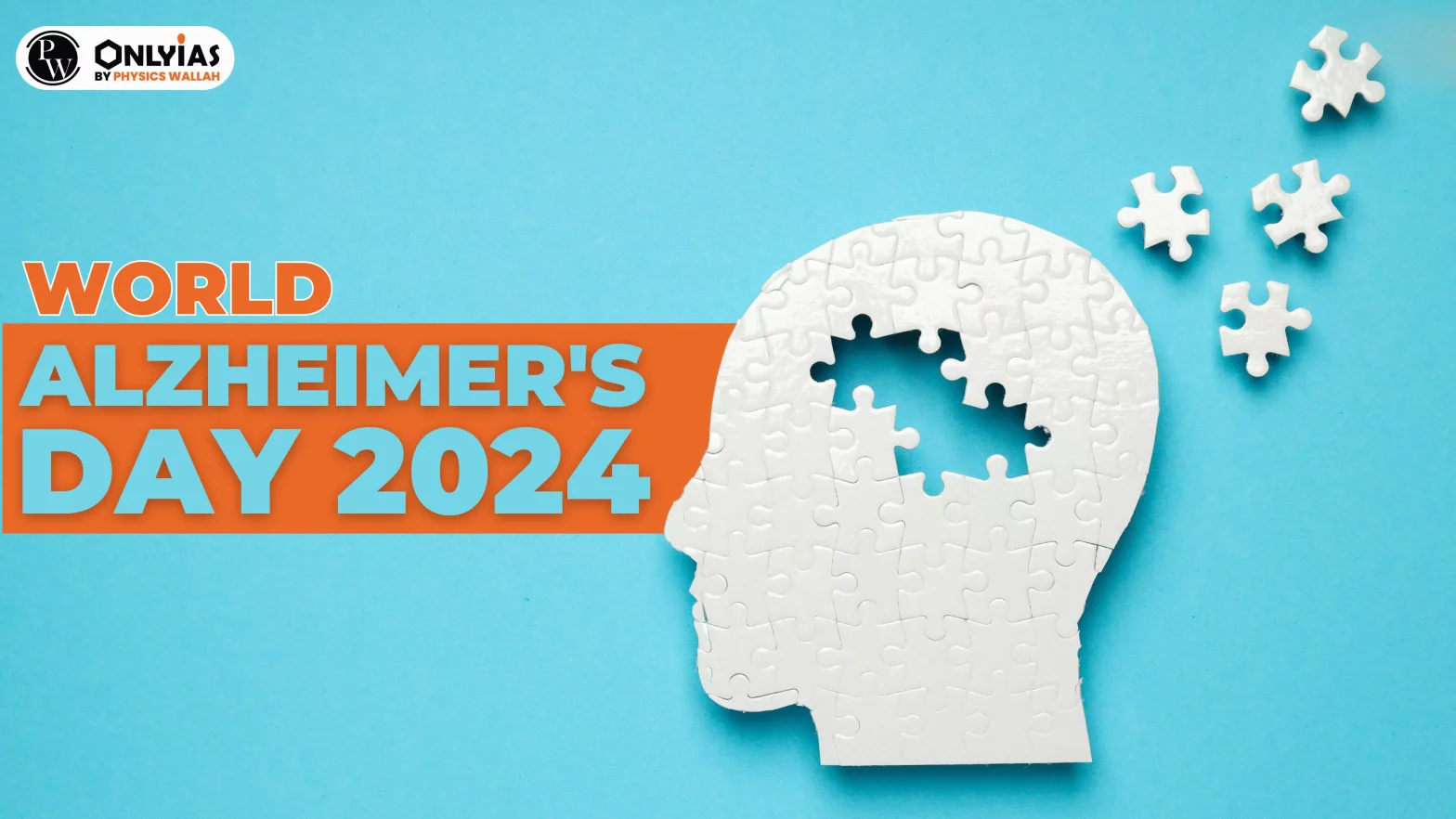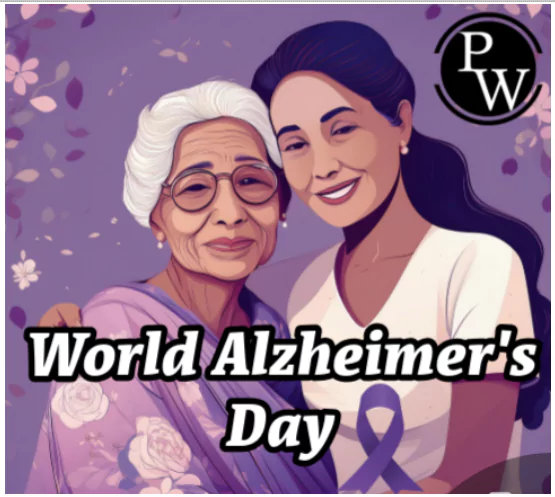Learn about World Alzheimer's Day 2024, observed on September 21, to raise global awareness of Alzheimer's Disease, its impact, and the importance of early detection and care.

World Alzheimer’s Day 2024: World Alzheimer’s Day is an international event that is observed every year to raise awareness about Alzheimer’s Disease, its impact, and the importance of early detection and support for people who are suffering from Alzheimer’s disease. As a UPSC aspirant, it is necessary to understand the significance of this event, as it aligns with key topics related to health, global awareness, and societal impact. We have created this guide to provide an in-depth look at World Alzheimer’s Day 2024, including its theme, significance, and implications, framed for UPSC preparation.
World Alzheimer’s Day is observed annually on September 21. This day is dedicated to raising global awareness about Alzheimer’s Disease, a progressive neurological disorder that leads to memory loss, cognitive decline, and ultimately, loss of ability to perform simple tasks. Alzheimer’s Disease is the most common cause of dementia, a group of symptoms affecting memory, thinking, and social abilities.

World Alzheimer’s Day will fall on Saturday, September 21, 2024. This day is a focal point of World Alzheimer’s Month, a global campaign showing no disgrace associated with Alzheimer’s and encouraging people to seek help, either for themselves or for those they care for.
World Alzheimer’s Day 2024 will be observed on September 21, with a global focus on raising awareness about Alzheimer’s Disease and supporting affected individuals. This day aims to highlight the importance of early diagnosis and care for Alzheimer’s patients, reduce the stigma around dementia, and encourage support for research and caregiving initiatives. Below is an overview of key details:
| World Alzheimer’s Day 2024 Overview | |
| Aspect | Details |
| Event Name | World Alzheimer’s Day 2024 |
| Date | September 21, 2024 |
| Purpose | Raise awareness about Alzheimer’s disease and dementia and encourage support and care for those affected. |
| Theme | Time to act on dementia, Time to act on Alzheimer’s |
| Symbol | Purple Ribbon |
| Organized By | Alzheimer’s Disease International (ADI) and the World Health Organization (WHO) |
| Target Audience |
|
| Key Activities |
|
World Alzheimer’s Day was established by Alzheimer’s Disease International (ADI) in 1994, observing the 10th anniversary of the organization. Since its establishment in 1994, this day has been dedicated to spreading awareness about Alzheimer’s Disease, by educating the public and supporting those affected. After many years, World Alzheimer’s Day has become a globally recognized event, with governments, NGOs, and communities participating in campaigns and activities that promote understanding and aid for dementia patients.
The observance of World Alzheimer’s Day is especially important as it helps to address many social, economic, and healthcare issues. Alzheimer’s Disease not only affects millions of people on the global level but it also places a massive burden on relatives, caregivers and healthcare systems. In 2024, over 55 million people worldwide are living with dementia, and Alzheimer’s is responsible for up to 70% of these cases. It is expected that the numbers will increase as life expectancy rises, which makes it necessary to promote awareness and support more than ever.
Time to act on dementia, Time to act on Alzheimer’s” is the theme for World Alzheimer’s Day in 2024.
The World Alzheimer’s Day 2024 theme can provide a broader importance of dementia care, healthcare policies, and societal support systems which makes it easy to study for UPSC Candidates. Aspirants should focus on how Alzheimer’s awareness fits into the country’s healthcare priorities, especially in the context of non-communicable diseases.
Alzheimer’s Disease is a degenerative brain condition that mostly affects older adults. It is characterised by the buildup of proteins called beta-amyloid plaques and tau tangles in the brain, leading to the death of brain cells. The disease is characterized by
From a UPSC perspective, knowing the basics of Alzheimer’s and its impact on global and national health is essential, particularly for topics related to public health, geriatric care, and non-communicable diseases.
| Causes of Alzheimer’s Disease | |
| Category | Details |
| Genetic Factors | Family history and inherited gene mutations may increase risk. |
| Age | Risk increases significantly after age 65. |
| Environmental Factors | Exposure to certain toxins or brain injury may result to risk. |
| Lifestyle Factors | Poor diet, lack of physical activity, smoking, and alcohol consumption. |
| Brain Changes | Accumulation of amyloid plaques and tau tangles disrupt brain function. |
| Vascular Issues | Conditions like hypertension, diabetes, and high cholesterol. |
| Symptoms of Alzheimer’s Disease | |
| Category | Details |
| Memory Loss | Difficulty in remembering recent events, conversations, or appointments. |
| Cognitive Decline | Trouble with problem-solving, reasoning, and judgment. |
| Disorientation | Confusion about time, place, and familiar routes or people. |
| Difficulty with Routine Tasks | Struggling to complete everyday tasks like cooking or driving. |
| Language Problems | Difficulty in finding the right words or following conversations. |
| Mood Changes | Depression, anxiety, irritability, or apathy. |
| Behavioural Changes | Increased aggression, social withdrawal, or changes in sleep patterns. |
In India, as the elderly population is growing, we are facing increasing risk of Alzheimer’s Disease. Studies show that over 4 million people in India suffer from some kind of dementia, and many cases go undiagnosed due to the lack of awareness. The National Health Policy 2017 recognizes the importance of addressing non-communicable diseases, including neurological disorders like Alzheimer’s.
The World Health Organization (WHO) has developed a Global Action Plan on the Public Health Response to Dementia 2017-2025, which aims to reduce the impact of dementia on a global level through improved awareness, prevention, and treatment strategies. The World Alzheimer’s Month campaign also highlights global collaboration and research.
In India, NGOs such as the Alzheimer’s and Related Disorders Society of India (ARDSI) play a significant role in spreading awareness about World Alzheimer’s Day and supporting those who are affected by Alzheimer’s Disease. Additionally, The government of India is also including Alzheimer’s in health policies that focus on elderly care as part of non-communicable diseases.
World Alzheimer’s Day 2024 is an important event for raising awareness about Alzheimer’s Disease and its far-reaching impacts on society. As a UPSC aspirant, understanding the significance of this day, the challenges created by Alzheimer’s, and the global and national responses to dementia is vital for many parts of the syllabus, including health, social justice, and international relations. Staying updated on the World Alzheimer’s Day 2024 theme and related policies can provide valuable insights into contemporary healthcare challenges, preparing you for both the Prelims and Mains examinations.
Sign up for the PWOnlyIAS Online Course by Physics Wallah and start your journey to IAS success today!
The World Alzheimer's Day 2024 theme is "Time to act on dementia, Time to act on Alzheimer's".
Alzheimer's Week 2024 is part of World Alzheimer's Month and usually runs in the third week of September. The focus is on creating awareness about Alzheimer's Disease and providing support for patients and caregivers.
September 2024 is observed as World Alzheimer's Month, a global campaign aimed at raising awareness about Alzheimer's Disease. The campaign includes World Alzheimer's Day 2024, which falls on September 21.
World Alzheimer's Day is celebrated to spread awareness about Alzheimer's Disease, promote early diagnosis, and highlight the challenges faced by patients and caregivers. It also aims to reduce the stigma associated with dementia.
World Alzheimer's Day was first initiated by Alzheimer's Disease International (ADI) in 1994. The day marks the anniversary of ADI's foundation and emphasizes the need for global attention on Alzheimer's Disease.
Alzheimer's Day in 2024 observed on Saturday, September 21, during World Alzheimer's Month, with the aim of increasing public awareness about Alzheimer's and dementia.

<div class="new-fform">
</div>